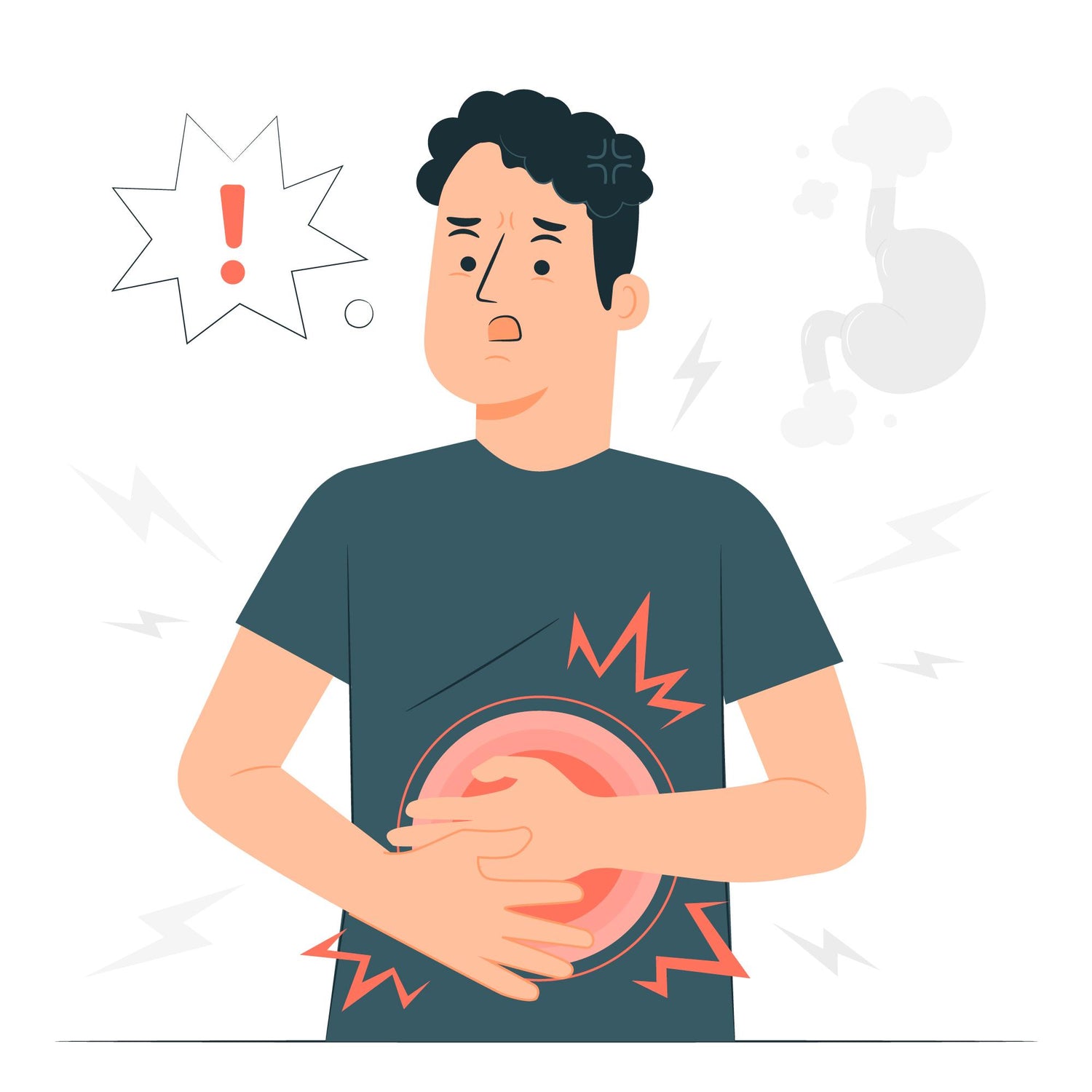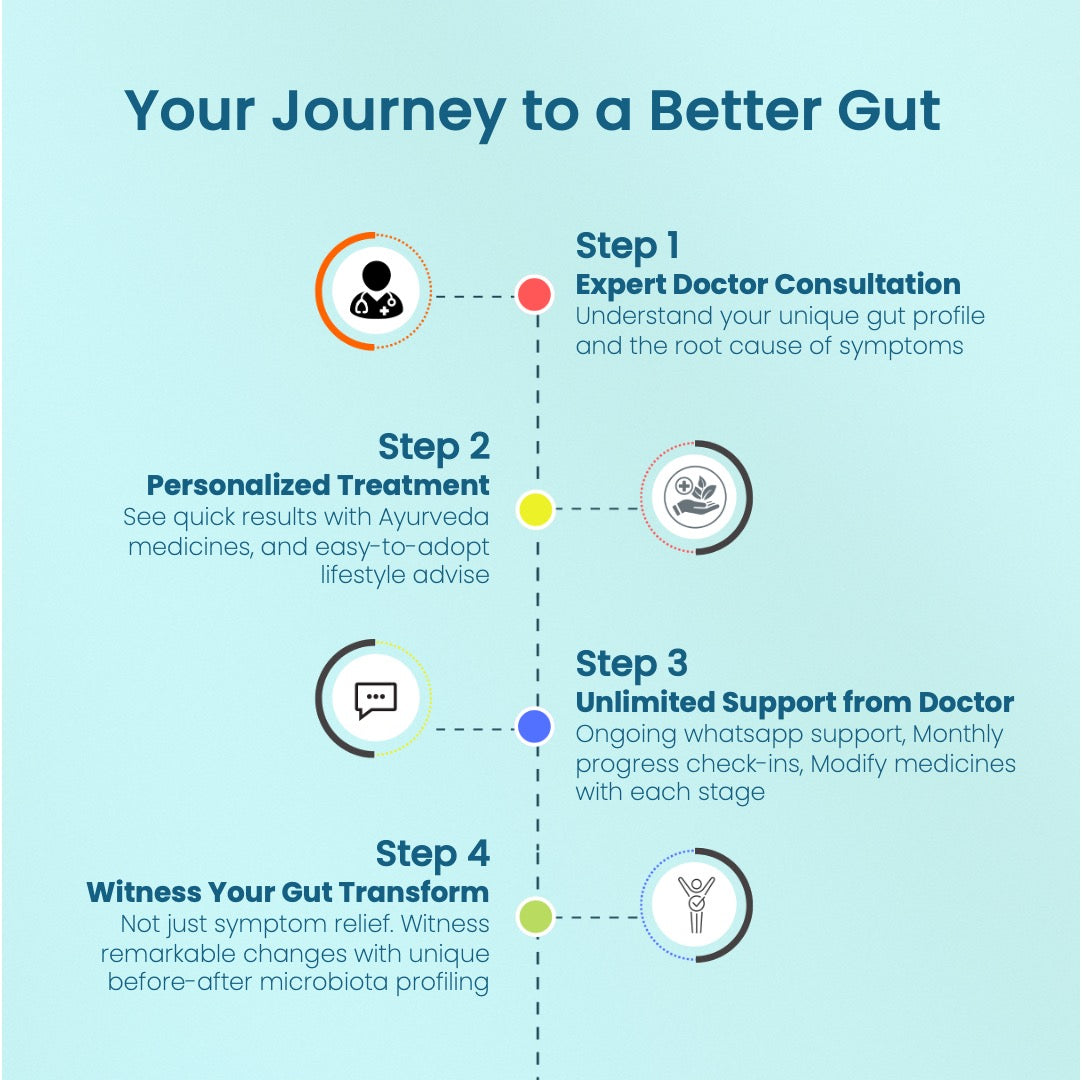Home / pages / Bloating
Bloating
Bloating: Understanding the Causes and Finding Lasting Relief
That uncomfortable feeling of fullness, tightness, or swelling in your abdomen? You're not alone. Bloating is a common experience, a physical manifestation of distress within your gastrointestinal (GI) tract. It occurs when your GI tract is filled with excess gas or air, causing discomfort and a feeling of fullness. While occasional bloating is common, frequent or severe bloating can signal underlying digestive issues. Understanding the diverse factors that contribute to bloating is the first step towards finding lasting relief.
At gCODE, we recognize that bloating is rarely a standalone issue. Our evidence-based holistic approach considers the multi-dimensional interplay of your lifestyle and health to find the source of the problem. We empower you with the knowledge and expert care to reclaim your gut health.
What is Bloating?
Bloating is a condition where the abdomen feels full, tight, or swollen, often accompanied by a visible distension of the stomach. Bloating is more than just a feeling; it's a physical manifestation of distress within your gastrointestinal (GI) tract. It occurs when the gastrointestinal (GI) tract is filled with excess gas or air, causing discomfort, pain, and a feeling of fullness. While occasional bloating is common, frequent or severe bloating can be a sign of underlying digestive issues such as constipation, irritable bowel syndrome (IBS), or food intolerances. In most cases, bloating is temporary and can be managed through simple lifestyle and dietary adjustments.
What Causes Bloating?

The causes of bloating are as diverse as the individuals who experience it. Here are the most common causes:
1. Dietary Factors
2. Food Intolerance & Sensitivities
3. Digestive Issues
4. Other Factors like hormonal changes, stress, anxiety, and other medical conditions
Dietary Factors
1. High FODMAP Foods:
Fermentable oligosaccharides, disaccharides, monosaccharides, and polyols (FODMAPs) are short-chain carbohydrates that can be poorly absorbed in the small intestine, leading to fermentation by gut bacteria and subsequent gas production. Common culprits include onions, garlic, wheat, dairy, beans, and certain fruits.
2. Fried and Fatty Foods
These foods slow down digestion, leading to prolonged food retention in the stomach and intestines, resulting in discomfort and bloating.
3. Carbonated Drinks:
Soda, sparkling water, and beer introduce carbon dioxide gas directly into the digestive system.
4. Artifical Sweeteners:
Sugar alcohols like sorbitol and xylitol, commonly found in sugar-free products, can ferment in the gut, leading to bloating.
5. High-fiber Foods:
While fiber is essential for gut health, excessive consumption of high-fiber foods like beans, lentils, broccoli, cabbage, and whole grains can cause gas and bloating.
Food Intolerance and Sensitivities
Food intolerance occurs when the digestive system struggles to process specific foods. It should not be confused with food allergy. While allergies provoke sudden, systemic symptoms (e.g., hives, breathing difficulties), intolerances cause gradual, localized issues such as bloating, headaches, or diarrhea, often linked to the quantity consumed. There is evidence that food intolerance is on the rise driven by our environment as well as modern agricultural practices, such as pesticide use and nitrogen-rich fertilizers that alter crop proteins, increasing intolerance triggers.
1. Lactose Intolerance:
People who are lactose intolerant (stemming from a deficiency in the lactase enzyme needed to digest lactose) may experience bloating after consuming milk, cheese, or yoghurt.
2. Non-Celiac Gluten Sensitivity:
Food containing gluten may trigger mild immune system reactions such as headache and fatigue combined with bloating.
3. Histamine Sensitivity:
Impaired breakdown of histamine in fermented/preserved foods.
4. Sulfite Intolerance:
Reaction to additives in processed foods or wine.
Digestive Issues
1. Constipation:
Slowed movement of stool through the digestive tract can lead to gas buildup and bloating.
2. Irritable Bowel Syndrome (IBS):
This chronic gut disorder is characterized by abdominal pain, bloating, and altered bowel habits (diarrhea or constipation).
3. Small Intestinal Bacterial Overgrowth (SIBO):
An overpopulation of bacteria in the small intestine can lead to excessive gas production and bloating.
Other Factors
1. Swallowing Air (Aerophagia):
Eating or drinking too quickly, chewing gum, or sucking on hard candies can lead to excessive air swallowing and bloating
2. Hormonal Changes:
Fluctuations in hormone levels, particularly during menstruation and pregnancy, can lead to fluid retention and bloating.
3. Stress and Anxiety:
The gut-brain axis plays a crucial role in digestion. Stress can slow gut motility, increase stomach acid production, and cause intestinal muscle contractions, leading to bloating.
4. Medical Conditions:
Chronic bloating can be a symptom of underlying health issues like gastroesophageal reflux disease (GERD), endometriosis, and ovarian disorders.
Risk Factors and Complications Associated with Bloating
While bloating itself is not always dangerous, persistent bloating can lead to several complications and indicate underlying health risks.
1. Chronic Gut Inflammation:
Unaddressed bloating due to poor digestion, food sensitivities, or microbiome imbalances can trigger chronic inflammation in the gut, increasing the risk of conditions like IBS, leaky gut syndrome, and metabolic disorders.
2. Nutrient Malabsorption:
Bloating caused by gut dysbiosis or conditions like SIBO or celiac disease would prohibit your body from absorbing essential nutrients, leading to deficiencies in iron, B vitamins, and other vital nutrients, impacting overall health.
3. Impact on Mental Health and Daily Life:
Studies suggest that bloating is a major quality-of-life disruptor as it can cause discomfort, disrupt daily routines, and lead to anxiety about food choices.
4. Underlying Medical Conditions:
Chronic bloating may be a symptom of more serious health issues like ovarian disorders, endometriosis, or certain cancers.
5. Disrupted Gut Motility:
Chronic bloating can lead to further disruptions in gut motility, creating a vicious cycle of digestive issues.
6. Increased Intestinal Permeability (Leaky Gut):
Prolonged inflammation and gut dysbiosis associated with chronic bloating can increase intestinal permeability, allowing toxins and undigested food particles to enter the bloodstream.
7. Increased risk of developing other digestive disorders:
If the root cause of bloating is not addressed, it can increase the risk of developing other digestive disorders.
Diagnosis and Treatment of Bloating
Best Practices to Manage Bloating
- Mindful Eating: Eat slowly, chew your food thoroughly, and avoid gulping air.
- Identify Trigger Foods: Pay attention to which foods seem to worsen your bloating and try eliminating them.
- Stay Hydrated: Drinking enough water can aid digestion.
- Gentle Movement: Light exercise like walking can help move gas through your system.
- Stress Management: Practice relaxation techniques to reduce the impact of stress on your gut.
- Consider Dietary Adjustments: Explore options like reducing high-FODMAP foods or increasing soluble fiber (gradually).
When to Seek Medical Attention?
Consult a healthcare professional if you experience:
• Persistent and severe bloating
• Unexplained weight loss
• Blood in stool
• Severe or persistent abdominal pain
• Nausea or vomiting
• Heartburn that doesn't improve
• Feeling full quickly when eating
• Having a family history of gastrointestinal conditions
How is Chronic Bloating diagnosed?
Diagnosis may involve a comprehensive evaluation, including:
• Detailed Medical History
• Physical Examination: of your abdomen for distension, tenderness, and bowel sounds.
• Blood Tests: To check for underlying conditions like celiac disease, inflammatory markers, or thyroid issues.
• Stool Tests: To assess for infections, inflammation, or malabsorption.
• Imaging Tests: Such as abdominal X-rays, ultrasounds, or CT scans, if necessary, to visualize the digestive system.
• Endoscopy or Colonoscopy: In some cases, to directly examine the lining of the esophagus, stomach, small intestine, or colon.
Conventional Treatment and Limitations
Conventional treatment for bloating often include quick fixes like antacids, laxatives or “magic” home remedies. Sometimes, medications like antispasmodics for abdominal pain or antibiotics for suspected SIBO is prescribes too. The typical dietary advice include avoiding gas-producing foods or elimination diets like the low-FODMAP diet. However, these solutions only address the surface-level symptoms without tackling the root cause, thereby, rarely bringing lasting relief. They may not consider individual variations in gut microbiome imbalances, food sensitivities beyond common intolerances, the impact of stress and the gut-brain axis, or subtle imbalances in digestive function.
At gCODE, we recognize that bloating is rarely a standalone issue. Our evidence-based holistic approach considers the individual triggers and underlying imbalances to find the source of the problem. Then, they develop a personalized treatment plan that considers your unique Prakriti, diet, lifestyle, and stress management techniques, often incorporating Ayurvedic herbs as needed.

Access the best gut expert doctors from the comfort of your home and recover under their continued guidance.
Reclaim Your Gut Health: Embrace a Bloating-Free Life
Bloating doesn't have to be a recurring burden. At gCODE, we empower you with the knowledge, expert care, and personalized solutions to reclaim your gut health and live a life free from the discomfort of bloating.

